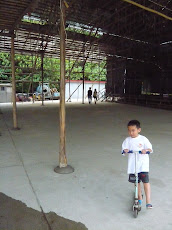Adaptation is such a painful experience, and watching an adapted film is even more torturous. il mare is one of my all-time-favourites. The romance and the 'romantic' lies on the plot - how could two people falling in love with two years apart, without interacting with each other. It's a rather spiritual mode of yearning. It's all about romance in the modernity - all about alienation and most importantly - the possibility of allowing oneself to indulge into such an 'untouchable romance'. We all love the ones we could not get. Isn't this film saying exactly the same thing? Just that it talks about two people from two different temporalities.
The American adaptation sucks. It ruins the original mood and affect. The 'untouchability' is ruined and rewritten. Both films have a very nice 'lake house', of different achitectural and structural meanings. The Korean one is really built on the shore, serving as an end of a long walkway extension. The house has a name of its own - 'il mare', meaning 'the sea'. What is there is the sea is the horizon, which you can see, but never touch it. When you think you reach the horizon, it's not there, but you see another line ahead of you as another new horizon.
The American house is more pro-father. It has a tree planted in the middle. The father is the centre of the family, forever there, influencing the residents (his son). This is nothing special, but too obvious. "Are you crazy? That is a glass house. You have no privacy", one character says in the film. Yet, it's a glass house. You can see the view from within, but never touch it as well because you are separated by the glass. Also, who is there to watch you anyway? The privacy is laid out so clearly without any concealment. The only regret is that there's no spectators, very lonely.
The Korean one has more long shots. It is the setting and the art direction that shape the mood of the film. The American one just has too many close-ups (not to mention the sparkless acting and interaction between characters). Kate and Alex (Sandra Bullock and Keanu Reeves) just talk too much to each other. They are visitors of instant chatroom who occasionally sending each other massive emails rather than people really living their lives with two years apart. The romance is technologized and globalized. The human touch is not more to be found.
The story is quite drastically rewritten upon adaptation. There are too many unnecessary and annoying characters. You see the film and you know who I am pinpointing. The most 'mysterious' is the ending, which according to the time theory, they would not have been able to meet. Kate is crying at the mailbox, hoping Alex can get her mail, thus escaping from her death. It is Feb 14 2006 in Alex's time and Feb 14 2008 in Kate's time. If t stands for Alex's temporal signifer, then Kate's is always t+2. So why could Kate, after crying, stand up, turn around and meet Alex? It does not make sense.
Kate knows Alex in 2006, so t+2 = 2006. In other words t = 2004. They would only meet when t = 2006 (t+2 = 2008). Temporally speaking the plot is flawless. Yet, Kate can appear in 2006 and 2008 at the same time because she is always two years ahead. The privilege of a person living in the present is the existence of him/herself in the past. However, one should question why Alex can trepass the preset t and t+2 notion to appear all of a sudden in 2008 in the end.......



No comments:
Post a Comment